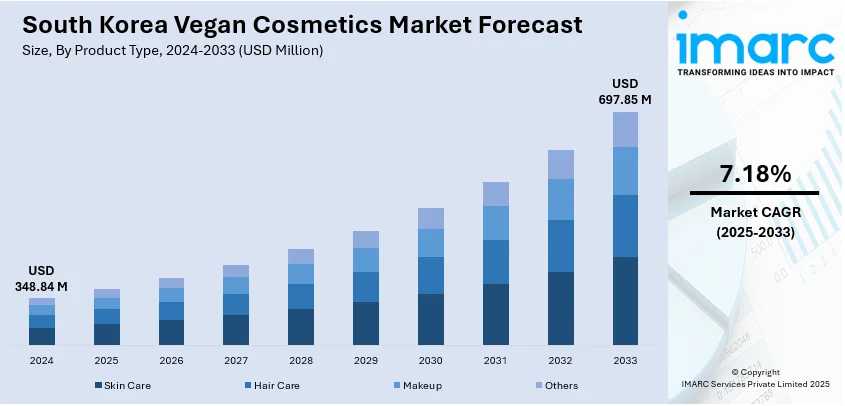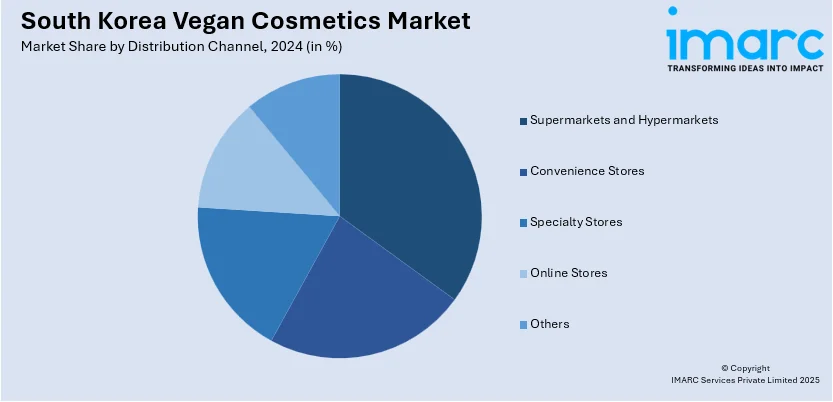
South Korea Vegan Cosmetics Market Size, Share, Trends and Forecast by Product Type, Distribution Channel, and Region, 2025-2033
South Korea Vegan Cosmetics Market Overview:
The South Korea vegan cosmetics market size reached USD 348.84 Million in 2024. Looking forward, the market is expected to reach USD 697.85 Million by 2033, exhibiting a growth rate (CAGR) of 7.18% during 2025-2033. The market is driven by ethical values, beauty innovation, and rising demand for sustainable lifestyles. Consumers are becoming more conscious of the environmental and animal welfare impact of their purchases, seeking plant-based, cruelty-free alternatives that align with their personal values. Government support for cruelty-free regulations and increased visibility of vegan certifications have also built consumer trust, while social media, influencer marketing, and tech-savvy retail platforms boost accessibility and awareness, further contributing to the growing South Korea vegan cosmetics market share.
|
Report Attribute
|
Key Statistics
|
|---|---|
|
Base Year
|
2024
|
|
Forecast Years
|
2025-2033
|
|
Historical Years
|
2019-2024
|
| Market Size in 2024 | USD 348.84 Million |
| Market Forecast in 2033 | USD 697.85 Million |
| Market Growth Rate 2025-2033 | 7.18% |
South Korea Vegan Cosmetics Market Trends:
K‑Beauty Innovation Meets Vegan Ethics and Plant‑Based Science
In South Korea, the vegan cosmetics market is evolving through the seamless fusion of K‑Beauty innovation and plant‑based ethics. Local manufacturers are increasingly incorporating ethically certified vegan ingredients into hallmark Korean skincare formats, such as sheet masks, essences, ampoules, and cushion foundations, while maintaining K‑Beauty’s famed emphasis on multi‑step routines, hydration, and lightweight textures. Korean vegan brands tend to utilize region-specific botanicals such as mugwort, Jeju Island green tea, lotus leaf extract, and fermented rice water, which are prized for their calming and brightening abilities. Such products are particularly attuned to Korean skin issues such as sensitivity, hydration balance, and pollution resistance. Moreover, the process of formulation tends to combine fermentation technology locally revered for making bioavailable nutrients with vegan and cruelty-free sourcing. This thoughtful approach reflects the broader K-Beauty philosophy of marrying high efficacy with gentle, natural actives but reframed through an ethical vegan lens. As a result, consumers feel confident that they are receiving high-performance skincare that's modern, ethical, and rooted in domestic botanical heritage, all integral themes defining current market momentum in South Korea's vegan cosmetics space.

To get more information on this market, Request Sample
Certification Ecosystems, Regulatory Support, and Consumer Trust Signals
The South Korea vegan cosmetics market is marked by an increasing chain of certification frameworks and governmental support that strengthen consumer confidence. Korean shoppers are remarkably well versed with logos issued by domestic certification authorities such as Korea Agency of Vegan Certification and Services, which checks brand's own claims regarding the testing on animals, origin of ingredients, and whether the product meets the vegan standards. Brands have started to include these certification marks on packaging and websites to reassure customers that products meet their ethical criteria. Furthermore, new policies and retailer standards prioritize cruelty‑free methods, with some beauty chains asking for vegan or cruelty‑free substantiation prior to listing new lines. This regulation‑supported environment promotes both existing brands and new brands to comply with transparent sourcing, clean composition, and environmental stewardship. As consumers become more regulatory conscious, vegan brands advertise their certifications as a part of integrated communications, linking ethical principles with legal reliability. Such convergence of regulatory transparency, certification prominence, and consumer awareness reinforces brand reliability and is a crucial factor in fueling brand loyalty and South Korea vegan cosmetics market growth in the Korean beauty market.
Digital Culture, Urban Eco-Conscious Consumers, and Influencer-Led Growth
South Korea’s highly connected, urban demographic, especially millennials and Gen Z in metro areas like Seoul, Busan, and Daegu, is fueling rapid expansion of vegan cosmetics through digital platforms and influencer engagement. Vegan beauty brands in Korea engage popular influencers and eco-conscious beauty bloggers on Instagram, YouTube, and TikTok to share product routines, ingredient deep dives, and behind‑the‑scenes brand stories. Many content creators demonstrate the performance of vegan products through multi‑step K‑Beauty routines, highlighting vegan cushion foundations, plant‑based serums, and cruelty‑free sheet masks within their daily rituals. This visual culture of transparent ingredient storytelling and peer‑shared reviews accelerates discovery and trust, making vegan cosmetics trend among communities focused on sustainability and skin health. Urban shoppers also gravitate toward limited‑edition eco‑packaging, minimalist reusable glass jars, and refillable systems marketed through social media campaigns. Such online‑first tactics enable vegan cosmetics to resonate with wider audiences beyond specialist eco‑shoppers, baking them into mainstream beauty routines. The convergence of influencer trustworthiness, K‑Beauty routine culture, and urban consumer values drives market innovation and positions South Korea's vegan cosmetics industry as trend sensitive and culturally resonant.
South Korea Vegan Cosmetics Market Segmentation:
IMARC Group provides an analysis of the key trends in each segment of the market, along with forecasts at the country and regional levels for 2025-2033. Our report has categorized the market based on product type and distribution channel.
Product Type Insights:
- Skin Care
- Hair Care
- Makeup
- Others
The report has provided a detailed breakup and analysis of the market based on the product type. This includes skin care, hair care, makeup, and others.
Distribution Channel Insights:

- Supermarkets and Hypermarkets
- Convenience Stores
- Specialty Stores
- Online Stores
- Others
A detailed breakup and analysis of the market based on the distribution channel has also been provided in the report. This includes supermarkets and hypermarkets, convenience stores, specialty stores, online stores, and others.
Regional Insights:
- Seoul Capital Area
- Yeongnam (Southeastern Region)
- Honam (Southwestern Region)
- Hoseo (Central Region)
- Others
The report has also provided a comprehensive analysis of all the major regional markets, which include Seoul Capital Area, Yeongnam (Southeastern Region), Honam (Southwestern Region), Hoseo (Central Region), and others.
Competitive Landscape:
The market research report has also provided a comprehensive analysis of the competitive landscape. Competitive analysis such as market structure, key player positioning, top winning strategies, competitive dashboard, and company evaluation quadrant has been covered in the report. Also, detailed profiles of all major companies have been provided.
South Korea Vegan Cosmetics Market News:
- In August 2024, Shinsegae revealed the purchase of AMUSE, a vegan beauty line, reflecting its initiatives to grow internationally and enhance profitability.
- In February 2024, Dear Dahlia, a vegan cosmetics brand from South Korea with approximately 300 locations worldwide, revealed that it was listed for sale for over 100 Billion Won (USD 75.5 Million). Korean and foreign private equity firms along with cosmetics companies explored acquiring a controlling interest in Baram International Co., the operator of the beauty brand.
South Korea Vegan Cosmetics Market Report Coverage:
| Report Features | Details |
|---|---|
| Base Year of the Analysis | 2024 |
| Historical Period | 2019-2024 |
| Forecast Period | 2025-2033 |
| Units | Million USD |
| Scope of the Report |
Exploration of Historical Trends and Market Outlook, Industry Catalysts and Challenges, Segment-Wise Historical and Future Market Assessment:
|
| Product Types Covered | Skin Care, Hair Care, Makeup, Others |
| Distribution Channels Covered | Supermarkets and Hypermarkets, Convenience Stores, Specialty Stores, Online Stores, Others |
| Regions Covered | Seoul Capital Area, Yeongnam (Southeastern Region), Honam (Southwestern Region), Hoseo (Central Region), Others |
| Customization Scope | 10% Free Customization |
| Post-Sale Analyst Support | 10-12 Weeks |
| Delivery Format | PDF and Excel through Email (We can also provide the editable version of the report in PPT/Word format on special request) |
Key Questions Answered in This Report:
- How has the South Korea vegan cosmetics market performed so far and how will it perform in the coming years?
- What is the breakup of the South Korea vegan cosmetics market on the basis of product type?
- What is the breakup of the South Korea vegan cosmetics market on the basis of distribution channel?
- What is the breakup of the South Korea vegan cosmetics market on the basis of region?
- What are the various stages in the value chain of the South Korea vegan cosmetics market?
- What are the key driving factors and challenges in the South Korea vegan cosmetics market?
- What is the structure of the South Korea vegan cosmetics market and who are the key players?
- What is the degree of competition in the South Korea vegan cosmetics market?
Key Benefits for Stakeholders:
- IMARC’s industry report offers a comprehensive quantitative analysis of various market segments, historical and current market trends, market forecasts, and dynamics of the South Korea vegan cosmetics market from 2019-2033.
- The research report provides the latest information on the market drivers, challenges, and opportunities in the South Korea vegan cosmetics market.
- Porter's five forces analysis assist stakeholders in assessing the impact of new entrants, competitive rivalry, supplier power, buyer power, and the threat of substitution. It helps stakeholders to analyze the level of competition within the South Korea vegan cosmetics industry and its attractiveness.
- Competitive landscape allows stakeholders to understand their competitive environment and provides an insight into the current positions of key players in the market.
Need more help?
- Speak to our experienced analysts for insights on the current market scenarios.
- Include additional segments and countries to customize the report as per your requirement.
- Gain an unparalleled competitive advantage in your domain by understanding how to utilize the report and positively impacting your operations and revenue.
- For further assistance, please connect with our analysts.
 Request Customization
Request Customization
 Speak to an Analyst
Speak to an Analyst
 Request Brochure
Request Brochure
 Inquire Before Buying
Inquire Before Buying




.webp)




.webp)












